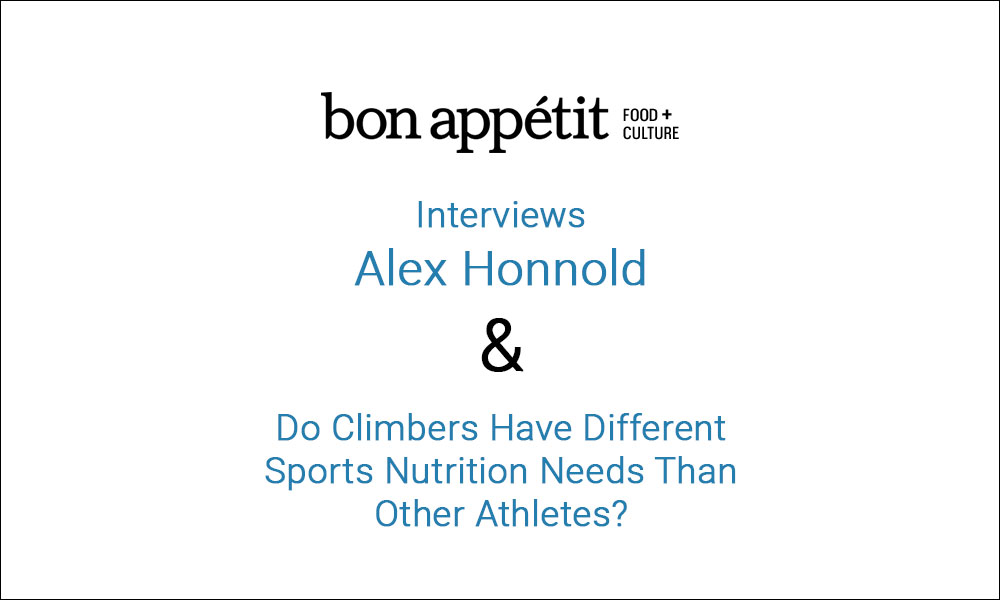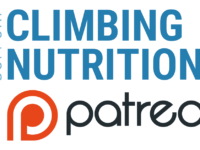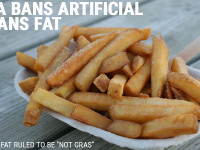Bon Appetit just interviewed Alex Honnold, which is pretty awesome. I mean, it’s only so often you get to peer inside the diet of one of the world’s best climbers, and while the article only gives a most cursory of glances, it’s something. Still, there’s one thing Alex said in the article that bugged me.
First, though, let me say that I’m not writing to criticize his diet, which overall seems to be pretty healthy. Again, only a cursory glance so really I can’t say, but it seems like a good focus on healthy foods. In a broader sense, I would say this is true of climbers in general: we’re a pretty healthy bunch of people, usually aware of our food choices, not afraid to eat our fruits and veggies, and “eating healthier” isn’t often something I need to focus on with a client. More so, I generally won’t call out someone on their diet—regardless of its quality—unless they specifically ask me to (as in they’re a client or walked up to me at the gym and directly asked my opinion). Diets are personal; I can help with them, but unless a person wants my help its not my business to correct them.
What I do want to reflect on is a comment he made in response to the question “Do you ever eat while you climb?”. In his reply, Alex went beyond documenting his own personal food preferences and made a statement about sports nutrition for climbing in general, a topic which I will generally call people out on and correct because such statements potentially alter the diets of other people (and not necessarily for the better).
Here’s his (slightly curtailed reply) to the question “Do you ever eat while you climb?”:
AH: Yeah, you have to. I do light snacking the whole time, like two pieces of fruit, a bar, and a bunch of nuts… Climbing isn’t like running or triathlons, where you have to constantly be eating blocks, gels, and pure sugar. Climbing is relatively slow, so you can pretty much eat anything and digest it as you climb.
This isn’t a particularly unique statement; like having a “generally healthy diet”, I would say many if not most climbers have this attitude towards sports nutrition for climbing. There is an idea that climbing is somehow different from other sports, and that different strategies (or even a lack of need for strategy) applies. But it’s an incorrect and ignorant statement as well, and I don’t want to see it propogated.
Climbing, like all other sports, can benefit from “constant” carbohydrate intake. Climbing is a power sport (with rare exceptions that don’t describe typical climbing anymore than ultramarathons describe typical running), and power sports require explosive anaerobic energy. We have two sources for this energy: creatine phosphate and carbohydrates. Both are limited (creatine phosphate far more so), and of these two sources only carbohydrates can be replenished during exercise. You can take creatine (and I recommend you do), but it contains no energy until it’s phosphorylated by the muscle, and that process is bottlenecked during exercise. Carbohydrates, though, already contain energy in a ready-to-use form.
If you’re only climbing for an hour, it’s unlikely supplemental simple carbohydrates (glucose, fructose, sucrose, dextrose, maltodextrin, etc.) are going to improve your performance because your body should have enough stored carbohydrates in the form of glycogen. If you’re working pretty hard, though, or are planning to climb for multiple hours, then giving your body those simple sugars will help you maintain your energy at a higher level, allowing you to perform better for longer. Fruits have this power, though they are relatively slow-digesting compared to a gel or sports drink; nuts do not. Nuts are mostly fat and protein, and neither fat nor protein can power anaerobic exercise. Fat cannot get you through a crux—fat can only power the low-intensity, well-below your grade movements.
Now, no athlete needs a constant supply of carbohydrates (usually 60 to 90 grams per hour, depending on the sport and intensity)—they do it because it improves their performance. You can run, climb, mountain bike, hike, surf, or whatever without supplemental carbs and have a great time because “performance” and “fun” are not synonymous. Most people don’t worry and don’t need to worry about whether their performance is at its peak when they go out and exercise because it’s not their goal, at least not directly. They’re out there to be with friends, enjoy the day, and maybe occasionally set some PRs.
Most people also don’t need to train or receive coaching to have a good time either, though. These are strategies to improve performance, not enjoyment. Most climbers—most athletes—know they could be better if they trained harder and got coached, but don’t care enough about their athletic performance to make the necessary changes. They’re happy doing a few laps at the gym to train, taking their friend’s beta as coaching, and kicking back some gorp and beer for a snack. They’re achieving their goal of enjoying the sport, and they don’t need to be Chris Sharma or Alex Puccio (or Alex Honnold for that matter) to have a great day.
But there are also athletes whose goal is to improve—who hire trainers to work them and coaches to mentor them, and [shameless plug] who should really hire sports nutritionists like myself to help them fuel themselves better and get the most out of their training. These athletes can certainly still throw some nuts in a repurposed chalk bag and call it good, but they’re limiting themselves and their potential. They may still feel strong and their overall energy may be fine, but they won’t be as strong, they won’t last as long, and their turbo tank is going to be bone dry sooner than it needs to be. These climbers can’t afford to believe that climbing is somehow different and that different rules apply; they need to fuel their activity to get the most out of it, and a constant supply of simple carbs like gels, blocks, and yes, even pure sugar, is going to help with that.
So my response to Alex Honnold’s comment is this: For the climber whose goals go beyond just having a good time, who wants to do the most they can to improve, climbing is exactly like running or triathlons, or sprinting or weight lifting or gymnastics or martial arts. These are all sports, and all sports benefit from carefully timed or continuous replenishment of the limited store of carbohydrates we need to do anaerobic work. You don’t need gels, blocks, or pure sugar to have a good time, but you do need them to maintain your highest possible level of performance.
As a final note, I know there will be those who will try to rebut my argument by mentioning how well Alex climbs despite not using gels, blocks, or sports drinks, so let me preempt those rebuttals with this:
Nutrition is just a single piece of the performance puzzle. You will always find athletes—even extremely talented athletes—who eschew optimal sports nutrition strategies and still offer amazing performances. You’ll also find extremely talented athletes who don’t employ optimal training strategies and who don’t get solid coaching, but most people also know that training and coaching improve performance in meaningful ways. So does good sports nutrition. You can be a great athlete without good sports nutrition (or training, or coaching)—in the relatively young and small world of competitive climbing, you can even be a world-class athlete—but the closer you move towards the topmost echelon of athletic performance, the more important great training, coaching, and nutrition become. Today, you won’t find any top competition climbers who don’t get solid training and coaching; I predict in twenty years, you won’t find any top competition climbers who don’t also have solid sports nutrition.
Anyway, go on over to Bon Appetit and give his interview a read—it’s well worth it!
UPDATE 4/19/2015: I’m afraid this post may have come across a little vitriolic, which was totally not my intention. I have nothing but respect for Alex and I don’t wish to come off antagonistically. I just wanted to provide some expert insight into sports nutrition for climbing, and his comment (a single comment in an entire article) was a good springboard.
As you might imagine, myths abound in the nutrition world—including with sports nutrition. There are certainly agents who should know better who are spreading false knowledge (and whom I combat on my other blog Rational Nutrition, but for the most part there is no animus, just understandable ignorance. We’re all ignorant of many things and I don’t think ignorance is bad, but I do think we should all carefully consider where our knowledge truly lies before sharing it with others.
So if you found my post to be overly critical, I hope you’ll reconsider based on my expressed motives. This isn’t an article on how Alex is wrong, but rather an article to illuminate a common myth about climbing—that it is somehow fundamentally different than other sports. That was my sole intention, and any hostility you may have read is 100% unintentional and not an accurate reflection of how I feel about Alex Honnold or anybody that repeats a sports nutrition myth for that matter.














